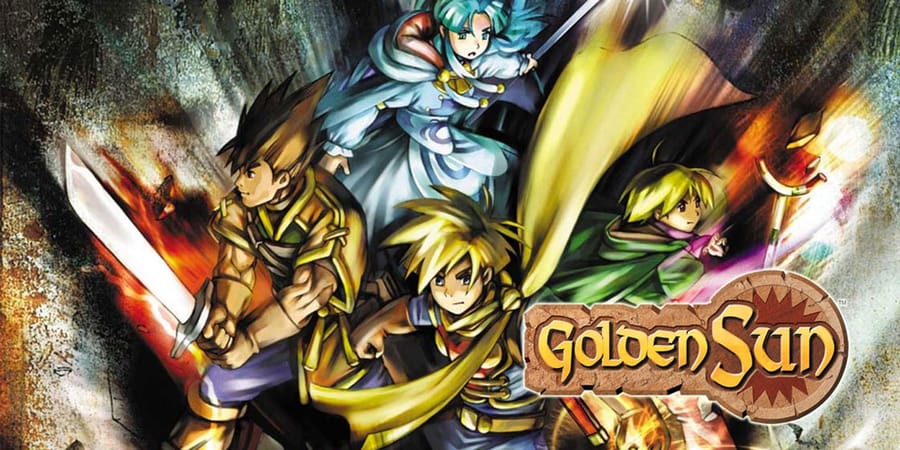I'm going to spoil this review to save you some time, dear reader – you should play Golden Sun.
I don't consider myself to be a contrarian by nature, but I am disillusioned with the state of our "modern" games industry. Golden Sun represents something triple-a publishers have left behind, and we the consumer are worse off as a result.
With all the big money in publishing, and the (underpaid and underappreciated) talent present in games development, it's hard to imagine an EA, or a Ubisoft, or even the original publisher of Golden Sun, Nintendo, setting resources aside to make something like Golden Sun today. It is a product of its time, for a series of platforms replaced by the smartphone, that have transitioned into our collective memories.
Not for me, though, and my homebrewed 3DSXL.
Again, I have Josh Strife Hayes and his excellent "was it any good" series of videos to thank for playing Golden Sun. That's right, those videos are not just a perfect companion to long sessions at the painting desk. Watching his video did spoil the game in its entirety, so, you know, buyer beware.
After waiting six months to forget about the contents of the video, I found a nefarious ROM, and away we went.
To be clear, Golden Sun is not perfect. However, Golden Sun gets a lot closer than most. Iteration on classic designs elements like those present in Final Fantasy and Chrono Trigger have resulted in a classic JRPG experience with its own identity.
But Golden Sun goes beyond being a clone of older JRPGs. Its story is compelling, the art style gorgeous, and for such a compact game, its combat system possesses near limitless depth, despite being limited to the form the Gameboy Advance.
I could do without those squeaky midi sounds for the dialogue though. Charming at first, annoying after twenty hours.
And I will absolutely knock the game for the standard JRPG bad habit of putting the player in a position where the way to progress is unclear or unintuitive. This creates an ugly cycle of dependence where you get stuck, so you consult a guide, discover the solution was an easily to overlook interaction, or a solution way out of left field.
This causes a death spiral where the next time you get stuck, you're more likely to consult a guide. And steadily, your tolerance to problem solve is whittled away until you have a walkthrough open on a second monitor. Fortunately, I learned my lesson about this from my FFV playthrough, and stayed away from the guides – this time.
When playing a game, your eye should be on the game, not the walkthrough. It's the same reason I think Ironman mode should be present in any turn-based game.
But I digress.
Golden Sun is compelling in the same way that Persona 5 is compelling. The confluence of its gameplay elements, story and visual design all overlap to enrich each other. Although, if I was put on the spot, I would tell you Golden Sun's primary strength is in its writing.
The one Golden Sun fan I know who doesn't read my reviews might disagree with me, but, hear me out.
A common complaint I have with video game writing in general, is that there are so many common tropes that undermine the potential of a game's narrative elements.
You can write a compelling overarching plot, then distract the player with meaningless side content until they lose sight of your main objective (Ghost Recon: Pick One, see also the Division). You can have the plot be almost completely divorced from the origin point of the story (Chrono Trigger). Or you can barely have an overarching plot at all, and weave the player through a series of smaller stories, none of which link together particularly well (FFV)
Not here. Golden Sun uses the "keep it simple, stupid" principle to maximum effect.
You step into the shoes of four adolescents – Isaac, Garet, Ivan, and Mia, on a quest to stop two villains, Saturos and Menardi, from lighting the elemental lighthouses. They've also kidnapped Kraden, the village elder, and Jenna, one of Issac and Garet's friends.
Simple, punchy, memorable.
The pursuit of the baddies will take you all over the continent of Weyard, as Golden Sun effortlessly weaves the player through a series of compelling local stories, that never take so long that you lost sight of this main overarching goal.
There's the village beset by thieves, a town filled with people turned into trees by a vengeful forest spirit, and protecting a ship's crew from monsters so you can travel across the sea. These are all simple but engaging stories that drive the player forward. The real genius is the way these subplots are written to always remind the player of their overarching goal.
Every town you venture into mentions how two powerful individuals and their hostages passed through recently. Characters know who you are, and know what your quest is. And in a master stroke of good writing, you catch up to Saturos and Menardi, only for them to get away.
No, it isn’t the multi-layered complex mess that you might find in Yakuza, and it isn't the heart-wrenching masterpiece of Persona 5, but its beauty is in its simplicity. I finished Golden Sun two weeks ago, and can remember the all the little vignettes and story beats. That, to me, is good writing.
But it's not just the story elements, but combat system too. Otherwise, we'd be playing Max Payne, and I don't have the time to replay that particular masterpiece. Maybe when my kids get older.
This is not going to be a deep dive into the layers of Golden Sun's combat mechanics – this isn't that type of article, and it would consume thousands of words.
What underpins the combat system is the the game's secondary resource system – what would usually be mana – regenerates steadily as you move through the world. This is required because exploration through the world sometimes requires you to use abilities out of combat, but it also creates a very interesting push-pull dynamic when exploring.
You start most encounters fresh-faced and bright-eyed with full resource bars, slowly depleting them by using your abilities until you run low. Then, you start using the other big part of the game's combat mechanics – Djinn.
Djinn control what class your characters are, dictate their base stats, and govern abilities they might have access to, but can also be used as abilities of their own. A damaging attack here, a buff there. And they can also be used to summon powerful elemental creatures that deal massive damage.
As mentioned above, this creates an interesting push and pull. As your power points run low, you rely more on your Djinn to get you through encounters until everyone's resources recover. This adds an element of resource management to exploration, keeping the player engaged to think about how they approach combat.
It also creates different approaches for boss battles. Do you try and hammer the boss down with explosive elemental summons as quick as you can, knowing that will leave you vulnerable without the base stats and class abilities of your Djinn? Or do you take your time, carefully applying Djinni buffs and using your spells and abilities? Such is the depth of the combat system, that each player will have their own opinions and ideas.
Contrast this with something like a Pokemon game. You eventually reach a point where your Pokemon become so strong, opponents become a series of nails for you to hammer in without thinking. It stops being fun, and becomes closer to a box-ticking exercise.
In Golden Sun, you never reach that point. There's always something to tinker with.
This also seems a good time as to mention that the combat visuals and sounds are also excellent. The character models and perspective are visually distinct, and the particle effects are bright, clear and colourful. And the sounds are crunchy and aurally pleasing. You feel every pop and bang.
So, we've established the story is great and the combat is great. But what seals the deal for me is the world exploration.
I hate to keep bringing it up, but FFV is the benchmark here. Similar story beats, similar combat mechanics, but where Golden Sun really breaks ranks is how you explore the world around you.
As the player travels through Weyard, they will be required to identify opportunities to use out of combat Psyenergy (pronounced SYN-ergy) abilities to move through the world. Pushing, pulling, and lifting objects. Freezing puddles of water. Making vines grow, and blowing leaves off trees.
I have talked in the past about how the best games have tight, interlocking gameplay loops. We have arrived at the point where Golden Sun brings it all together.
You're travelling through the world to find Kraden and Jenna, and to stop Saturos and Menardi. In your travels, you are constantly adjusting your combat strategies and finding more Djinn to expand your options in combat – sometimes you have lots of resources, sometimes you're only scraping by. And whilst you're working your way through the world, you're interacting with layers of interlocking puzzle mechanics.
And just to bring it all the way back, some of the local story beats involve obtaining Psyenergy abilities to continue your pursuit of Saturos and Menardi. Not just to "continue the game you're playing".
You are always engaged, always thinking, always moving. It's brilliance in a GBA cartridge.
Just in case you missed it. You should play Golden Sun.
Catch you next time,
Vulkan
Critical Information Summary
Review Platform: Nintendo 3DSXL (emulated)
Developer: Camelot
Publisher: Nintendo
Cost (At Time of Publish): Varies - second hand market only
Did you like this article? Did you hate it? Go over and keep the discussion going on the official Vulkan's Corner facebook page! - whilst you're at it, leave a like!

